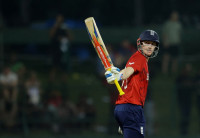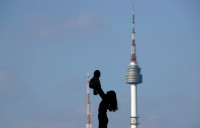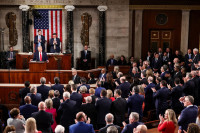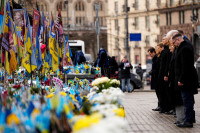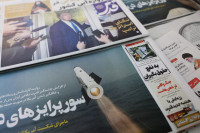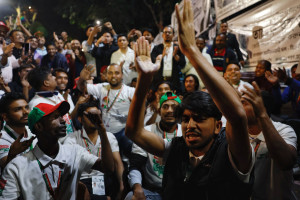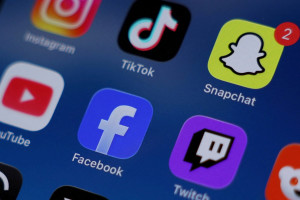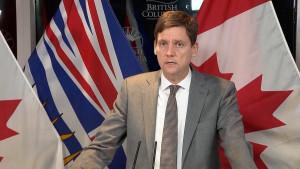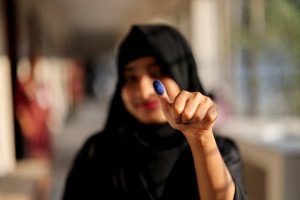World
Trump envoy’s embrace of Russian demands worries Republicans, US allies
Trump administration officials are increasingly at odds over how to break the deadlock between Ukraine and Russia.
Reuters
Less than 48 hours after dining with a negotiator sent by Russian President Vladimir Putin in Washington last week, Steve Witkoff, the US special envoy leading talks with Moscow, sat down with President Donald Trump in the White House and delivered a clear message.
The fastest way to broker a ceasefire in Ukraine, said Witkoff, was to support a strategy that would give Russia ownership of four eastern Ukrainian regions it attempted to annex illegally in 2022, two US officials and five people familiar with the situation told Reuters.
It was a point Witkoff had made previously – and publicly in a podcast interview with conservative media personality Tucker Carlson last month – but one that Kyiv has repeatedly rejected and that some US and European officials have dismissed as a maximalist Russian demand.
In the meeting with Trump, General Keith Kellogg, the president’s Ukraine envoy, pushed back against Witkoff, saying Ukraine, though willing to negotiate some terms related to disputed land, would never agree to unilaterally cede total ownership of the territories to Russia, said two of the sources.
The meeting ended without Trump making a decision to change the US strategy. Witkoff traveled to Russia Friday to meet Putin.
Trump administration officials are increasingly at odds over how to break the deadlock between Ukraine and Russia, with Witkoff and Kellogg - who favors more direct support for Ukraine - disagreeing on the best course forward, according to the US officials and people familiar with the matter and four Western diplomats who are in touch with administration officials.
Witkoff's office, the National Security Council, the State Department, Ukraine’s Foreign Ministry and the Russian Embassy in Washington did not respond to requests for comment.
In a break with normal security procedures, Witkoff had invited Kirill Dmitriev, the Russian envoy who is under US sanctions following Russia’s invasion, to his personal residence for dinner before the White House meeting.
That set off alarms inside the White House and the State Department, according to two people familiar with the situation. US officials avoid hosting officials from Russia – which has sophisticated intelligence capabilities – to their homes.
The dinner was rescheduled and took place at the White House instead.
Witkoff, an old friend of Trump’s who has helped secure key diplomatic victories for the president, has garnered some support from the Republican Party’s Ukraine skeptics but his proposals have stoked outrage among other Republicans who believe the administration has turned too sharply toward Moscow.
Some Republicans on Capitol Hill were so concerned about Witkoff's apparent pro-Russia stance in the Carlson interview that several called National Security Adviser Mike Waltz and Secretary of State Marco Rubio afterward to complain, according to a person familiar with the calls.
Since taking office in January, Trump has upended US foreign policy, pressing Ukraine to agree to a ceasefire while easing many of the measures the Biden administration had taken to punish Russia for its 2022 full-scale invasion of its neighbor.
Some US and European officials worry that as Witkoff pursues Trump’s strategy, the Russians are taking advantage of his lack of experience at the negotiating table, according to the two US officials and more than a dozen other people familiar with the administration’s internal deliberations, including Western diplomats.
“Witkoff must go, and Rubio must take his place,” read a March 26 letter from Eric Levine, a major Republican donor. The letter, sent to a group including Republican donors and seen by Reuters, was written after the Carlson interview and a Fox News appearance, and criticized Witkoff for praising Putin.
Trump has repeatedly said that he wants to broker a ceasefire in Ukraine by May, arguing the US must end a conflict that has killed hundreds of thousands and risks a direct confrontation between the US and nuclear-armed Russia.
But two partial ceasefire deals – one on energy infrastructure and one in the Black Sea – have stalled and the president has become frustrated over the lack of progress.
A Growing Role for Witkoff
Witkoff plays a central - and expanding - role in the Trump administration’s foreign policy. Even before Trump took office, Witkoff had helped secure a long-sought Gaza ceasefire - which has since unraveled - and later negotiated the return of a US citizen, Marc Fogel, from Russia.
He traveled to Russia on Friday to meet Putin and is expected in the Middle East for talks with Iran on Saturday, effectively leading yet another top priority national security assignment.
Witkoff first publicly floated the idea of handing over to Russia the four Ukrainian regions - Luhansk, Donetsk, Zaporizhzhia and Kherson - in the March 21 interview with Carlson.
“They’re Russian-speaking,” he said of the eastern territories. “There have been referendums where the overwhelming majority of the people have indicated that they want to be under Russian rule.”
Witkoff’s comments shocked many US national security officials - the special envoy’s rhetoric mirrored that of Russian officials. Western governments have called the hastily organised referendum votes a sham and pledged not to recognise their results.
Just a few days after the Carlson interview, the Wall Street Journal, owned by Rupert Murdoch’s News Corp, published an op-ed titled “Steve Witkoff Takes the Kremlin’s Side.”
Democrats have weighed in, too.
“Witkoff and Trump have committed a cardinal sin of diplomacy: they have put their desperation for a deal on full display,” said Ned Price, a former spokesperson for the State Department under President Joe Biden.
Witkoff has plenty of defenders within the administration, who say he has been unfairly maligned by foreign policy officials who hold hawkish views in a Republican Party that has increasingly renounced foreign intervention. Witkoff and Trump still maintain a strong personal relationship, according to multiple people familiar with their relationship.
“Special Envoy Witkoff has brought a wealth of private sector negotiating experience and urgency to the diplomatic stage and we’re already seeing results in just a few weeks,” National Security Adviser Mike Waltz told the Hill in a statement.
Allies See Pressure to Get Results
For US allies, the arguments and lack of progress toward a peace deal contribute to a sense that the US lacks a clear plan to end the war in Ukraine.
Two European officials, who have had recent contacts with the administration, said there was pressure for the negotiating team to quickly get results, which worried them that the US might not only accept moves that could undermine Ukraine, but Europe’s own security architecture.
The officials, who spoke on condition of anonymity, said they had not come away reassured from their discussions and did not feel there were clear final objectives on the American side.
Despite frequent conversations between Witkoff and Kellogg, the administration has not established a coordinated Ukraine policy process. Contrary to standard practice, the National Security Council has hosted only one principals’ meeting - a meeting that includes all or most of the president’s top national security advisers - on the issue, a person familiar with the matter said, leading to greater confusion inside the administration and among allies in Europe about the direction of the peace talks.
Two senior Western diplomats who are in touch with the administration said they believe Washington lacks a “clear plan” on how to move forward and what to do if Russia continues to delay.
“We sometimes hear contradictory things from different parts of the administration,” one of the diplomats, speaking on the condition of anonymity, said. “That also adds to the sense that there is no real plan here.”




 20.22°C Kathmandu
20.22°C Kathmandu